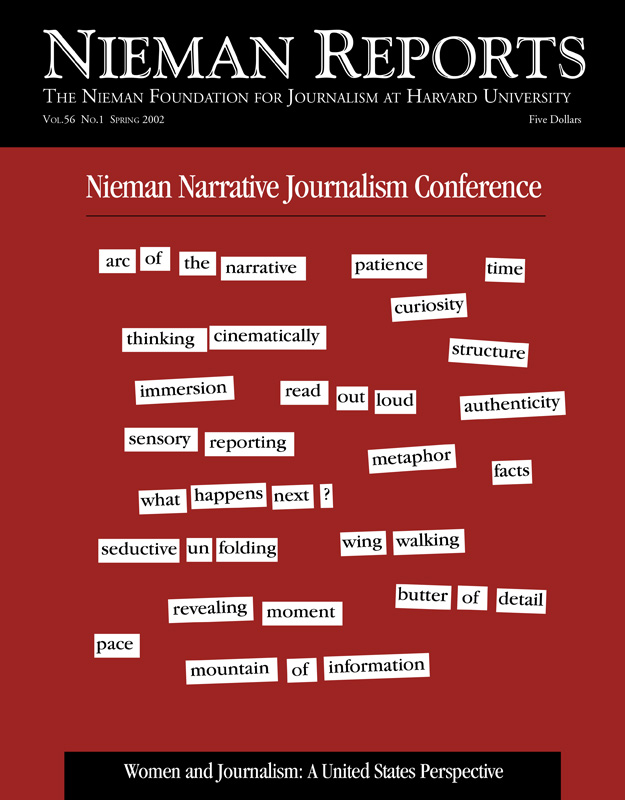
Nieman Narrative Journalism Conference
On a late fall weekend in 2001, the Nieman Program on Narrative Journalism convened its first conference. More than 800 journalists traveled to Cambridge, Massachusetts to take part in three days of interactive seminars, lectures and readings with many of the nation’s leading practitioners. By the end of the conference, there had been 26 seminars, four plenary sessions, and three group readings, and it is from words spoken at these sessions that Nieman Reports compiled the report that follows. — Melissa Ludtke
In getting ready to spend the weekend with you, I called on some friends and asked them a single question: “Why do we need stories?” Their answers, dashed off quickly and straight from the heart, were both dazzling and instructive, and I want to pass them on to you.
The first is from Mary Lawrence. She teaches with me at the journalism school at the University of Missouri, and Mary started as a small community newspaper editor/writer. She wrote editorials for The Indianapolis Star for a while then went overseas and was on the copy desk of The Wall Street Journal. She came home and ended up editing her own hometown newspaper, and finally the pressures of chain journalism drove her out.
This is from Mary: “People have had their stories from the beginning, whether they’re fables or for teaching lessons great and small, or histories that tell us where we came from, or big stories that help us cope with the world. Look at how we crave stories about any event from how a team prepped for an event, to how people got out of the World Trade Center.
“We’re fooling ourselves if we think we communicate primarily by bursts of information. We live for stories—whether they’re movies or TV shows or plays or poems or even newspaper pieces. We want stories told to us over and over again. Why else would we want to watch movies multiple times, or insist on seeing ‘White Christmas’ and ‘Miracle on 34th Street’ every year? They comfort us, they arouse us, they excite us and educate us, and when they touch our hearts we embrace them and keep them with us.
“Why else would we need VCR’s? Why else would shows make money in syndication? We want our stories. They answer eternal questions like, ‘How could this happen?’ And they help us build theories about why this could happen. Those are the two questions people will always ask about the Garden of Eden, and those are the two questions that everybody had when the World Trade Center collapsed.”
Alex Tizon is a writer at The Seattle Times. And when I asked him the question, this is what he said: “Why do we need stories? Well, who would we be without them? And what would any of this mean? A reporter once asked Norman Maclean why he wrote his book, ‘Young Men and Fire,’ and he replied, ‘To find out what happened.’ If you haven’t read it, it’s about this catastrophic forest fire that killed a bunch of firefighters somewhere in Montana and, as in all such events, nobody really knew what was happening, and nobody knew afterwards, until somebody, somewhere, pulled together all the nodules of scene and fact and put them into a story.
“Stories give shape to experience and allow us to go through life unblind. Without them, the stuff that happens would float around in some glob and none of it would mean anything. Once you have a version of what happened, all the other good stuff about being human can come into play. You can laugh, feel awe, commit a compassionate act, get pissed, and want to change things.”
RELATED ARTICLE
"'Stories are for eternity, when memory is erased, when there is nothing to remember except the story.'"
- Jacqui BanaszynskiThe other lesson I want to leave you with comes from a friend of mine at The Oregonian, a big, rough-talking reporter named Pete Sleeth, a business and an investigative reporter; he covered forestry. I inherited him, and we used to have battles in the newsroom because I’d try to get him to do storytelling. And one day he stood up in the newsroom and shouted, “You just want goddamn girl grafs.” So Pete and I had this whole conversation about how girl grafs and boy grafs really have to kind of marry to birth a baby here.
Pete spent two years covering the forest service, and every time he’d come back on a news story he’d tell me that he wanted to write about the changing forest service policy and budgets and that it was really important. And, of course, every time he said that my eyes would glaze over and I could imagine thousands of readers at home falling asleep in their breakfast cereal, “Oh, great, forest service policy.” Finally one day we thought, wait a minute, we have this big forest and mountain right outside our backyard here in Portland called Mt. Hood. Why don’t we do a profile of a mountain?
And Pete decided, okay, he would do that. I asked him to write me diary entries every week, because I wanted him to get past the usual convention. As he was reporting, I made him hike the mountain. One day he comes back and he’s climbed Mt. Hood and he’s sending me these diary entries every week. And at one point he looked at me and he said, “Don’t you dare make me interview the mountain. You’re not going to make me interview the mountain, are you?”
And I said, “Well, Pete, it is your main character, and I kind of have to know what it says.” So Pete did this story, and I’ll read you just a little passage of it, because this is an investigative-just-the-facts business reporter guy who wrote a 200-inch profile of a mountain that’s got humor in it and soul and passion. And he interviewed the mountain
I asked Pete last week to tell me why we need stories, and he sent me back a note which, he confessed, was wine-induced, and he said this: “I need stories to know I’m not alone. That is reason enough. They tell me what we do and how we live and occasionally, if I’m lucky, they tell me why. There is a commonality to stories that makes us whole beings. Walt Whitman knew that when he wrote ‘Leaves of Grass’: ‘I celebrate myself,/And what I assume, you shall assume,/For every atom belonging to me as good belongs to you.’” This is an investigative reporter quoting Walt Whitman. I just think this is so hot. And he continues, “They unify us. ‘The Old Man and the Sea’ makes sense to us because it reaffirmed truths about perseverance and strength and fate. Stories, by the way, are just plain fun.”
That’s that last lesson: Don’t forget to have fun. We’re talking about wing walking after all, we’re not talking about certified public accounting or factory work, despite the assembly line nature of producing the news. We get to soar up there, if we dare. Our publications provide the plane and a safe place to land. Our editors pilot us through those harrowing dips and turns, but it’s the writers out there on the wings, alone and unfettered, opening their arms to the work and risking their selves in the process. My god, what could be more fun.
Stories are our prayers, so write and edit and tell them with due reverence, even when the stories themselves are irreverent. Stories are parables. Write and edit and tell yours with meaning so each tale stands in for a larger message, each moment is a lesson, each story a guidepost on our collective journey.
Stories are history; write and edit and tell yours with accuracy, understanding and context and with unwavering devotion to the truth. Stories are music; write, edit and tell yours with pace and rhythm and flow, throw in the dips and twirls that make them exciting, but stay true to the core beat. Remember that readers hear stories with their inner ear.
Stories are our conscience; write and edit and tell yours with a passion for the good they can do, the wrongs they can right, the truths they can teach, the unheard voice they can give sound to. And stories are memory; write and edit and tell yours with respect for the past they archive and for the future they enlighten.
Finally, stories are our soul; so write and edit and tell yours with your whole selves. Tell them as if they are all that matters, for if that is what you do—tell our collective stories—it matters that you do it as if that is all there is. I’ve told many stories in my life. I’ve told my own as a reporter and I’ve midwifed several more and more beautiful ones as an editor, and I feel I’m only just beginning to understand their power and purpose and how to do them justice.
The last person who I asked to send me a little thing about stories is a woman who was a long-time friend of mine from the Saint Paul Pioneer Press named Katherine Lanpher. She now does Minnesota Public Radio, a wonderful talk show there. And she sent me this:
I believe that stories are the connective tissue of the human race, that whether you are dissecting a school levy or the politics of South Korea, at the heart of every issue is a human element that leads to the three most beautiful words in any language: What happened next? And if you answer that question you are a storyteller.
They say language makes us human. That notion is being challenged as we discover that apes have language and whales have language. I welcome them into our fold. I’m not threatened by them, quite frankly, because I think what makes us human are stories and only by telling them do we stay so.
An editor once said something that at the time startled me, but I’ve come to embrace it, and that’s that the only good journalist is an improving journalist. Think about that. Think about the demands on us and the competition for readers’ time and the pressure to tell stories with accuracy and significance and depth and speed and creativity. That means no matter how good you are, the only way to stay good is to improve.
Your presence here is a testament to your desire to do that. You’ve got wonderful inspiration and wonderful tricks and techniques from the masters. Now you go back to the real world—that’s the hard part—and to the mundane frustrations and logistical realities of that world. So you need to commit to yourself and to the craft that you won’t let those frustrations and realities stop your quest to improve.
The first is from Mary Lawrence. She teaches with me at the journalism school at the University of Missouri, and Mary started as a small community newspaper editor/writer. She wrote editorials for The Indianapolis Star for a while then went overseas and was on the copy desk of The Wall Street Journal. She came home and ended up editing her own hometown newspaper, and finally the pressures of chain journalism drove her out.
This is from Mary: “People have had their stories from the beginning, whether they’re fables or for teaching lessons great and small, or histories that tell us where we came from, or big stories that help us cope with the world. Look at how we crave stories about any event from how a team prepped for an event, to how people got out of the World Trade Center.
“We’re fooling ourselves if we think we communicate primarily by bursts of information. We live for stories—whether they’re movies or TV shows or plays or poems or even newspaper pieces. We want stories told to us over and over again. Why else would we want to watch movies multiple times, or insist on seeing ‘White Christmas’ and ‘Miracle on 34th Street’ every year? They comfort us, they arouse us, they excite us and educate us, and when they touch our hearts we embrace them and keep them with us.
“Why else would we need VCR’s? Why else would shows make money in syndication? We want our stories. They answer eternal questions like, ‘How could this happen?’ And they help us build theories about why this could happen. Those are the two questions people will always ask about the Garden of Eden, and those are the two questions that everybody had when the World Trade Center collapsed.”
Alex Tizon is a writer at The Seattle Times. And when I asked him the question, this is what he said: “Why do we need stories? Well, who would we be without them? And what would any of this mean? A reporter once asked Norman Maclean why he wrote his book, ‘Young Men and Fire,’ and he replied, ‘To find out what happened.’ If you haven’t read it, it’s about this catastrophic forest fire that killed a bunch of firefighters somewhere in Montana and, as in all such events, nobody really knew what was happening, and nobody knew afterwards, until somebody, somewhere, pulled together all the nodules of scene and fact and put them into a story.
“Stories give shape to experience and allow us to go through life unblind. Without them, the stuff that happens would float around in some glob and none of it would mean anything. Once you have a version of what happened, all the other good stuff about being human can come into play. You can laugh, feel awe, commit a compassionate act, get pissed, and want to change things.”
RELATED ARTICLE
"'Stories are for eternity, when memory is erased, when there is nothing to remember except the story.'"
- Jacqui BanaszynskiThe other lesson I want to leave you with comes from a friend of mine at The Oregonian, a big, rough-talking reporter named Pete Sleeth, a business and an investigative reporter; he covered forestry. I inherited him, and we used to have battles in the newsroom because I’d try to get him to do storytelling. And one day he stood up in the newsroom and shouted, “You just want goddamn girl grafs.” So Pete and I had this whole conversation about how girl grafs and boy grafs really have to kind of marry to birth a baby here.
Pete spent two years covering the forest service, and every time he’d come back on a news story he’d tell me that he wanted to write about the changing forest service policy and budgets and that it was really important. And, of course, every time he said that my eyes would glaze over and I could imagine thousands of readers at home falling asleep in their breakfast cereal, “Oh, great, forest service policy.” Finally one day we thought, wait a minute, we have this big forest and mountain right outside our backyard here in Portland called Mt. Hood. Why don’t we do a profile of a mountain?
And Pete decided, okay, he would do that. I asked him to write me diary entries every week, because I wanted him to get past the usual convention. As he was reporting, I made him hike the mountain. One day he comes back and he’s climbed Mt. Hood and he’s sending me these diary entries every week. And at one point he looked at me and he said, “Don’t you dare make me interview the mountain. You’re not going to make me interview the mountain, are you?”
And I said, “Well, Pete, it is your main character, and I kind of have to know what it says.” So Pete did this story, and I’ll read you just a little passage of it, because this is an investigative-just-the-facts business reporter guy who wrote a 200-inch profile of a mountain that’s got humor in it and soul and passion. And he interviewed the mountain
Mount Hood might speak in a couple of ways.
It might belch—a mighty roar of gas, molten rock and calamity shot like a pinball from 60 miles below. For the mountain is the child of the ocean, the progeny of an ages-old conveyor belt, delivered up as the ocean floor slowly slides under the North American continent. And as the Juan de Fuca plate dives beneath the Northwest, rock melts, and steam forms, bursting up through peepholes in the Earth’s crust.
More likely, the voice would be softer, and the mountain would speak through a slight, brown-haired woman who lives and works in Gresham, a booming city on the eastern edge of the suburban frontier that rolls towards toward the forest.
Roberta A. Moltzen, 46, holds the daunting job of supervisor of the Mount Hood National Forest. She is one of two women forest supervisors in Oregon and Washington and one of only 18 in the nation’s 153 national forests. She dresses in Forest Service green when she wants to be official, drives federal vehicles with utmost care and speaks with even greater caution.
Moltzen has run the forest since mid-1995. It is her first stint as a forest supervisor, a post job with tremendous independence and burdened by overwhelming responsibility. She starts each day with this knowledge: More visitors flock to her forest each year; she has less money than ever to make them welcome.
I asked Pete last week to tell me why we need stories, and he sent me back a note which, he confessed, was wine-induced, and he said this: “I need stories to know I’m not alone. That is reason enough. They tell me what we do and how we live and occasionally, if I’m lucky, they tell me why. There is a commonality to stories that makes us whole beings. Walt Whitman knew that when he wrote ‘Leaves of Grass’: ‘I celebrate myself,/And what I assume, you shall assume,/For every atom belonging to me as good belongs to you.’” This is an investigative reporter quoting Walt Whitman. I just think this is so hot. And he continues, “They unify us. ‘The Old Man and the Sea’ makes sense to us because it reaffirmed truths about perseverance and strength and fate. Stories, by the way, are just plain fun.”
That’s that last lesson: Don’t forget to have fun. We’re talking about wing walking after all, we’re not talking about certified public accounting or factory work, despite the assembly line nature of producing the news. We get to soar up there, if we dare. Our publications provide the plane and a safe place to land. Our editors pilot us through those harrowing dips and turns, but it’s the writers out there on the wings, alone and unfettered, opening their arms to the work and risking their selves in the process. My god, what could be more fun.
Stories are our prayers, so write and edit and tell them with due reverence, even when the stories themselves are irreverent. Stories are parables. Write and edit and tell yours with meaning so each tale stands in for a larger message, each moment is a lesson, each story a guidepost on our collective journey.
Stories are history; write and edit and tell yours with accuracy, understanding and context and with unwavering devotion to the truth. Stories are music; write, edit and tell yours with pace and rhythm and flow, throw in the dips and twirls that make them exciting, but stay true to the core beat. Remember that readers hear stories with their inner ear.
Stories are our conscience; write and edit and tell yours with a passion for the good they can do, the wrongs they can right, the truths they can teach, the unheard voice they can give sound to. And stories are memory; write and edit and tell yours with respect for the past they archive and for the future they enlighten.
Finally, stories are our soul; so write and edit and tell yours with your whole selves. Tell them as if they are all that matters, for if that is what you do—tell our collective stories—it matters that you do it as if that is all there is. I’ve told many stories in my life. I’ve told my own as a reporter and I’ve midwifed several more and more beautiful ones as an editor, and I feel I’m only just beginning to understand their power and purpose and how to do them justice.
The last person who I asked to send me a little thing about stories is a woman who was a long-time friend of mine from the Saint Paul Pioneer Press named Katherine Lanpher. She now does Minnesota Public Radio, a wonderful talk show there. And she sent me this:
I believe that stories are the connective tissue of the human race, that whether you are dissecting a school levy or the politics of South Korea, at the heart of every issue is a human element that leads to the three most beautiful words in any language: What happened next? And if you answer that question you are a storyteller.
They say language makes us human. That notion is being challenged as we discover that apes have language and whales have language. I welcome them into our fold. I’m not threatened by them, quite frankly, because I think what makes us human are stories and only by telling them do we stay so.
An editor once said something that at the time startled me, but I’ve come to embrace it, and that’s that the only good journalist is an improving journalist. Think about that. Think about the demands on us and the competition for readers’ time and the pressure to tell stories with accuracy and significance and depth and speed and creativity. That means no matter how good you are, the only way to stay good is to improve.
Your presence here is a testament to your desire to do that. You’ve got wonderful inspiration and wonderful tricks and techniques from the masters. Now you go back to the real world—that’s the hard part—and to the mundane frustrations and logistical realities of that world. So you need to commit to yourself and to the craft that you won’t let those frustrations and realities stop your quest to improve.


